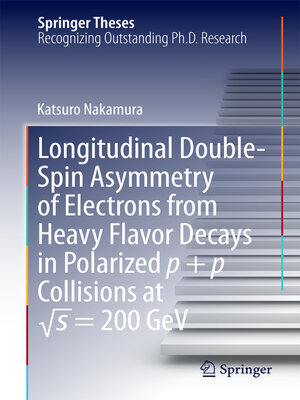Longitudinal Double-Spin Asymmetry of Electrons from Heavy Flavor Decays in Polarized p + p Collisions at √s = 200 GeV
ebook ∣ Springer Theses
By Katsuro Nakamura

Sign up to save your library
With an OverDrive account, you can save your favorite libraries for at-a-glance information about availability. Find out more about OverDrive accounts.
Find this title in Libby, the library reading app by OverDrive.



Search for a digital library with this title
Title found at these libraries:
| Library Name | Distance |
|---|---|
| Loading... |
In this thesis, the measurement of double-spin asymmetry for electron production from heavy flavor decays was performed in a Relativistic Heavy Ion Collider (RHIC) in the PHENIX experiment at Brookhaven National Laboratory to measure the polarized parton distribution function of gluon in the small Bjorken x region (x~0.01).
For this experiment, for the first time a Hadron Blind Detector (HBD), which is a position-sensitive gas Cherenkov counter with Gas Electron Multiplier whose surface is evaporated by CsI, was employed. This HBD contributes to reducing the background from electron pairs produced by real and virtual photon conversion. Furthermore, the author develops a new analysis method for the background reduction, and the signal-to-background ratio is improved by a factor of roughly 2.0. Using the combination of the HBD and a new analysis method, the double-spin asymmetry of the electron production with transverse momentum ranging 0.5 < pT < 3.0 GeV/c is measured and confirmed to be zero-consistent within the limit of the statistical uncertainty of about 1%. This result identifies the constraint of the gluon polarization in the small Bjorken x region, a worldwide first.







